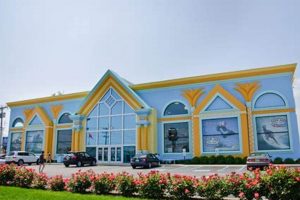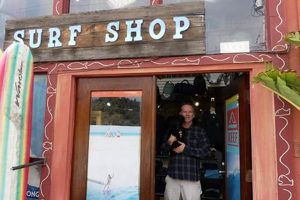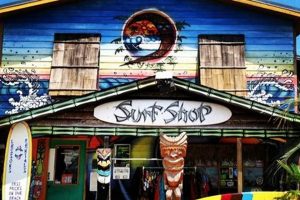Retail establishments that specialize in equipment, apparel, and accessories catering to the surfing lifestyle and ocean-related activities are present in the coastal city. These businesses typically offer a variety of surfboards, wetsuits, swimwear, and related items. As an example, one might find a shop providing surfboard rentals, repair services, and instruction for novice surfers.
These local businesses play a vital role in supporting the surfing community, providing access to essential gear and expert advice. Their presence enhances the coastal tourism sector, attracting visitors seeking to engage in water sports. Historically, these establishments have served as gathering places for surfers, fostering a sense of community and promoting the sport’s culture.
The following sections will explore the specific offerings, locations, and community impact of these businesses within the context of the city’s coastal environment, as well as provide insight into selecting the appropriate establishment based on individual needs and preferences.
Essential Guidance for Surfing Needs
Selecting a suitable provider requires careful consideration to ensure optimal equipment and service acquisition.
Tip 1: Assess Inventory Diversity: A comprehensive selection of surfboards, wetsuits, and accessories is crucial. Evaluate the availability of different board types (shortboards, longboards, funboards) to match skill level and wave conditions. Wetsuit thickness and material should correspond to water temperature.
Tip 2: Scrutinize Product Quality: Prioritize establishments offering reputable brands known for durability and performance. Inspect construction quality of surfboards and wetsuits for signs of wear or manufacturing defects.
Tip 3: Evaluate Expertise and Service: Knowledgeable staff can provide valuable advice on equipment selection, board repair, and surfing techniques. Assess the level of personalized service offered, including custom surfboard ordering and sizing assistance.
Tip 4: Compare Pricing Structures: Obtain quotes from multiple locations to ensure competitive pricing. Consider factors beyond the initial cost, such as warranty coverage and included services.
Tip 5: Investigate Rental Options: For occasional surfers or those seeking to try different equipment, renting from a reputable source is advisable. Verify rental terms, insurance coverage, and the condition of rental gear.
Tip 6: Seek Recommendations and Reviews: Consult online reviews and local surfing communities for insights into the reputation and customer satisfaction of various providers. Word-of-mouth referrals can provide valuable perspectives.
Acquiring surfing equipment and services necessitates a methodical approach. Careful evaluation of inventory, quality, expertise, pricing, rental options, and recommendations is essential for a satisfactory experience.
The subsequent sections will delve into specific locations and their unique attributes, further aiding in the selection process.
1. Equipment Variety
The availability of a diverse range of surfing equipment within Wilmington’s retail establishments directly influences the accessibility and growth of the local surfing community. Shops offering a limited selection may cater only to experienced surfers with specific preferences, while those providing a broader inventory can attract beginners and individuals with varying surfing styles. This variety extends beyond surfboard types to include wetsuits suitable for different water temperatures, leashes of various lengths, traction pads, and other essential accessories. The causal link is clear: increased equipment variety expands the potential customer base and fosters a more inclusive surfing environment.
For example, a shop stocking both shortboards for performance surfing and longboards for cruising demonstrates a commitment to serving diverse skill levels. Similarly, offering soft-top boards suitable for beginners alongside high-performance epoxy boards allows newcomers to enter the sport with appropriate equipment. This variety is not merely about product quantity; it’s about providing the right equipment for individuals at different stages of their surfing journey. Shops that invest in stocking diverse equipment are more likely to become hubs for the local surfing community, attracting both experienced surfers seeking specialized gear and novices eager to learn.
In summary, the presence of equipment variety within the retail locations is a critical component of a thriving surfing scene. Overcoming the challenge of limited inventory is essential for ensuring accessibility and promoting growth within the surfing community. Understanding this relationship allows shops to better cater to local needs, contribute to the sport’s development, and strengthen their position within Wilmington’s coastal economy. The practical significance lies in recognizing that equipment variety is not simply a business strategy but a vital element in fostering a vibrant and inclusive surfing culture.
2. Local Community Support
Local community support is inextricably linked to the sustainability and success of businesses specializing in surfing equipment and apparel within Wilmington. These establishments function not solely as retail outlets but also as integral components of the local surfing culture. The reciprocal relationship involves the business providing essential resources and services to the surfing community, while the community, in turn, patronizes the business and contributes to its longevity. A tangible example involves shops sponsoring local surfing competitions or events, thereby providing financial and material assistance while simultaneously promoting the sport and attracting customers. Furthermore, these establishments often serve as informal gathering places where surfers can exchange information, share experiences, and foster a sense of camaraderie. The absence of such support mechanisms can lead to a decline in community engagement and, consequently, reduced business activity.
The economic vitality of these businesses is directly impacted by their participation in local initiatives. For instance, offering discounts to members of local surfing clubs or donating a portion of sales to environmental organizations focused on coastal preservation enhances the shop’s reputation and strengthens its connection to the community. Moreover, employing local residents and sourcing products from local suppliers further contributes to the economic well-being of the region. The practical application of this understanding necessitates active participation in community events, cultivation of relationships with local surf clubs and organizations, and implementation of sustainable business practices that align with the values of the local community.
In summary, local community support is a critical determinant of the long-term viability of surfing-related businesses in Wilmington. The challenge lies in consistently engaging with the community in meaningful ways and adapting business practices to meet the evolving needs of local surfers. This necessitates a shift from a purely transactional approach to one that prioritizes relationship building, community investment, and sustainable practices. These collaborative efforts not only benefit the business itself but also contribute to the overall health and vibrancy of Wilmington’s coastal community.
3. Board Repair Services
Board repair services represent an essential, often overlooked, component of surf shops in Wilmington. The inherent nature of surfing involves equipment damage due to collisions with rocks, other surfers, or simply the repetitive stress of waves. Surf shops that offer comprehensive repair services directly address this inevitable need, ensuring the longevity and functionality of customers’ surfboards. This offering establishes a critical link between the retail aspect of the business and the ongoing needs of the surfing community. A surf shop without readily available, competent repair services diminishes its value proposition to surfers, particularly those who frequently use their equipment. Real-life examples include damaged boards preventing surfers from engaging in their activity until repair is completed, consequently affecting their lifestyle and well-being. The practical significance lies in recognizing that board repair is not simply an ancillary service but a core element that contributes to customer retention and the overall health of the surfing ecosystem.
The quality and range of repair services offered significantly impact a surf shop’s reputation and market position. A shop equipped to handle various types of damage, from minor dings to major delaminations and fin replacements, inspires confidence among surfers. Furthermore, the speed and efficiency of the repair process are crucial factors. Surfers are often eager to return to the water, and a shop that minimizes turnaround time demonstrates an understanding of their needs. This necessitates skilled technicians, appropriate tools, and a streamlined repair workflow. Offering services such as color matching, custom graphics touch-ups, or even wetsuit repair further enhances the shop’s appeal. The practical application of this understanding involves investing in skilled labor, maintaining a well-equipped repair area, and implementing transparent communication regarding repair timelines and costs. This ensures customer satisfaction and fosters a sense of trust.
In conclusion, board repair services are inextricably linked to the success and relevance of surf shops in Wilmington. The provision of these services addresses a fundamental need within the surfing community, contributing to customer loyalty and the overall vitality of the local surfing culture. Challenges include managing repair volume during peak seasons and maintaining a competitive pricing structure while upholding quality. By recognizing the strategic importance of board repair and investing in the necessary resources, surf shops can solidify their position as valuable and trusted hubs within the surfing community, ensuring the continued enjoyment and accessibility of surfing in Wilmington.
4. Rental Availability
The provision of rental equipment by surf shops in Wilmington directly influences access to surfing for a broad spectrum of individuals, ranging from tourists to novice surfers and those seeking to experiment with different board types.
- Economic Accessibility for Tourists
Rental availability circumvents the need for tourists to transport bulky and potentially fragile surfboards, thereby reducing travel costs and logistical complexities. This facilitates spontaneous engagement in surfing, contributing to the local tourism revenue stream. For instance, a family visiting Wilmington for a week may opt to rent boards for a day or two, an option precluded by the need to purchase and transport equipment. The absence of rental options would directly limit tourist participation in surfing activities.
- Entry Point for Novice Surfers
Rentals allow beginners to try surfing without significant initial investment in equipment. This provides a low-risk opportunity to assess interest and aptitude before committing to a purchase. Surf shops offering beginner-friendly rental packages, often including soft-top boards and basic instruction, serve as crucial entry points to the sport. Without this accessibility, potential surfers may be deterred by the perceived cost and commitment, hindering the growth of the local surfing community.
- Experimentation with Board Types
Rental services permit experienced surfers to experiment with different board types beyond their personal quiver. This enables informed purchasing decisions and allows surfers to adapt to varying wave conditions. For example, a surfer accustomed to riding shortboards may rent a longboard to explore its capabilities in smaller waves or a stand-up paddleboard for flat-water conditions. The absence of this option limits experimentation and potentially restricts surfers’ ability to optimize their equipment for specific surf conditions.
- Maintenance and Storage Alternatives
Rentals provide a viable alternative for individuals lacking storage space or the capacity for regular board maintenance. This is particularly relevant for apartment dwellers or those with limited transportation options. Renting eliminates the responsibilities of cleaning, repairing, and storing a surfboard, making surfing more accessible to those with constraints on space or time. Without rental options, these individuals would be effectively excluded from participating in the sport.
In summary, rental availability offered by surf shops in Wilmington is a critical factor in promoting inclusivity, accessibility, and growth within the local surfing community. These services cater to a diverse range of individuals, from tourists seeking convenient recreational opportunities to novice surfers exploring the sport and experienced surfers experimenting with different equipment. The presence of robust rental programs strengthens the economic viability of surf shops and contributes to the overall vibrancy of the coastal tourism sector.
5. Expert Advice
The provision of informed guidance within retail establishments dedicated to surfing profoundly influences customer satisfaction, equipment selection, and the overall surfing experience in Wilmington. The presence of knowledgeable personnel distinguishes these shops, transforming them from mere retailers into valuable resources for surfers of all levels.
- Board Selection Guidance
Expert advice assists customers in choosing the appropriate surfboard based on skill level, wave conditions, and personal preferences. Staff members with extensive surfing experience can assess a customer’s abilities, analyze local surf breaks, and recommend specific board types, dimensions, and construction materials. This guidance minimizes the risk of purchasing unsuitable equipment, optimizing performance and enjoyment on the water. Without such expertise, customers may rely on superficial factors, leading to dissatisfaction and potentially hindering their progress.
- Wetsuit Suitability Assessment
Knowledgeable staff can advise customers on selecting wetsuits tailored to water temperature and individual tolerance levels. Factors such as neoprene thickness, seam construction, and insulation technology are crucial for thermal comfort and performance. Expert guidance ensures that customers are adequately protected from hypothermia and discomfort, extending their surfing sessions and enhancing their overall experience. Conversely, inadequate wetsuit selection can result in premature fatigue, impaired performance, and potential health risks.
- Accessory Recommendations and Usage
Expert advice extends to the selection and application of surfing accessories, including leashes, traction pads, fins, and board bags. Staff members can explain the purpose and functionality of each accessory, recommend appropriate sizes and styles, and provide instructions on proper installation and usage. This guidance enhances safety, improves performance, and prolongs the lifespan of equipment. Inadequate accessory selection or improper usage can compromise safety, reduce performance, and potentially damage equipment.
- Surf Condition Interpretation and Break Knowledge
Local surf shops often serve as repositories of knowledge regarding prevailing surf conditions and characteristics of local surf breaks. Staff members can provide insights into wave height, swell direction, tide levels, and potential hazards, enabling surfers to make informed decisions about where and when to surf. This expertise enhances safety, optimizes wave selection, and contributes to a more enjoyable surfing experience. Without such knowledge, surfers may encounter dangerous conditions, miss optimal surfing opportunities, or struggle to navigate unfamiliar surf breaks.
The availability of expert advice within establishments specializing in surfing equipment directly enhances the value proposition for customers in Wilmington. It serves as a critical differentiator, transforming these shops into trusted resources for surfers of all levels, fostering a sense of community, and promoting responsible and informed surfing practices. The effective dissemination of such knowledge contributes to the overall health and vibrancy of the local surfing culture.
Frequently Asked Questions
This section addresses common inquiries regarding businesses specializing in surfing equipment, apparel, and services within the context of Wilmington’s coastal environment. The following questions and answers aim to provide clear and concise information for residents and visitors alike.
Question 1: What factors determine the price of surfboards available at these establishments?
The pricing of surfboards is influenced by various elements, including material composition, construction techniques, brand reputation, and the presence of custom design features. Boards crafted from high-performance materials, employing advanced construction methods, or bearing the brand name of a renowned shaper typically command higher prices.
Question 2: What are the key considerations when selecting a wetsuit for surfing in this region?
Wetsuit selection necessitates careful consideration of water temperature, neoprene thickness, seam construction, and overall fit. Water temperatures fluctuate seasonally, requiring appropriate neoprene thickness to ensure thermal regulation. Sealed seams minimize water entry, while a snug fit maximizes insulation efficiency.
Question 3: Do these locations offer surfboard repair services, and what types of damage can they address?
Many of these establishments provide surfboard repair services, addressing a range of damage types, including dings, cracks, delaminations, and fin damage. The extent of repair capabilities may vary, necessitating inquiry regarding specific damage types and repair techniques.
Question 4: What options are available for individuals seeking to rent surfboards or related equipment?
Rental options typically encompass a variety of surfboard types, including shortboards, longboards, and beginner-friendly soft-top boards. Rental packages may also include wetsuits, leashes, and other essential accessories. Rental durations and pricing structures vary among establishments.
Question 5: How can individuals access expert advice regarding surfboard selection, surfing techniques, or local surf conditions?
These locations often employ staff members with extensive surfing experience who can provide informed guidance on equipment selection, surfing techniques, and prevailing surf conditions. Seeking advice from these knowledgeable individuals can enhance the surfing experience and promote safety.
Question 6: Do these businesses contribute to local community initiatives or environmental conservation efforts?
Certain establishments actively participate in local community initiatives and environmental conservation efforts. This may involve sponsoring local surfing events, supporting coastal cleanup programs, or donating a portion of sales to environmental organizations. Inquiring about such initiatives can inform purchasing decisions based on ethical considerations.
The preceding questions and answers offer a concise overview of key considerations pertaining to these businesses. Further research and direct engagement with these establishments are encouraged for more detailed information.
The following section will transition to examining the role of these establishments in promoting surf safety and responsible ocean stewardship.
Concluding Assessment
The preceding analysis has illuminated the diverse roles of the specialized retail establishments within Wilmington’s coastal community. These businesses provide not merely equipment and apparel, but also essential services, expert guidance, and crucial support for the surfing community. Their economic impact extends beyond retail transactions, contributing to local tourism and fostering a sense of shared identity among surfers.
Continued patronage and engagement with these resources are vital for ensuring the sustained accessibility and vibrancy of the surfing culture within the region. Recognition of their significance as cornerstones of the coastal lifestyle encourages responsible participation in the sport and promotes a deeper appreciation for the preservation of marine environments.




![Shop Ono Surf Shop: Gear & More | [Location] Learn to Surf & Skate: A Beginner's Step-by-Step Guide Shop Ono Surf Shop: Gear & More | [Location] | Learn to Surf & Skate: A Beginner's Step-by-Step Guide](https://universitysurfandskate.com/wp-content/uploads/2026/01/th-858-300x200.jpg)


